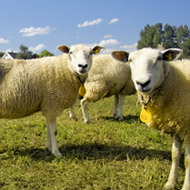Rise in demand for sheep fly strike products

Recent hot weather may lead to increased demand for sheep fly strike products.
In light of the recent spell of hot weather in the UK, the Veterinary Medicines Directorate (VMD) says there may be an increased demand for UK-authorised sheep fly strike products.
The directorate says it has contacted marketing authorisation holders to confirm the availability of relevant veterinary medicines for the treatment and prevention of fly strike.
While the supply of certain veterinary medicines may be intermittent over the coming months, the VMD says alternative products are available.
Veterinary surgeons are advised to contact the relevant marketing authorisation for more information about obtaining products.
To deal with supply problems, under the prescribing cascade vets are able to use veterinary medicines authorised in the UK for another species or different condition in the same species.
Or, if this is not possible, the vet may use a UK-authorised human product without prior notification to the VMD.
In the absence of a suitable human product authorised in the UK, veterinary surgeons may apply to import an EU-authorised veterinary medicines, or if this is not possible, a veterinary medicine authorised outside of the UK may be used, once an import certificate has been obtained.
Veterinary surgeons may also prescribe a "special" - a medicine prepared extemporaneously.
The VMD states that these options should only be explored when attempts to obtain and use UK-authorised products have failed.
Should veterinary surgeons become aware of any alternative EU-authorised products, import certificate applications can be submitted to the VMD online: http://www.vmd.defra.gov.uk/sis/default.aspx/
Guidance on the use of the cascade can be found on the VMD website: http://www.vmd.defra.gov.uk/pdf/vmgn/VMGNote13.pdf



 HMRC has invited feedback to its communications regarding the employment status of locum vets and vet nurses.
HMRC has invited feedback to its communications regarding the employment status of locum vets and vet nurses.